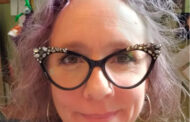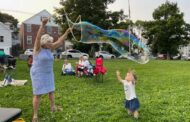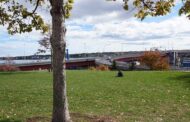
Susan LoGiudice: Free Trees for Residents to ReForest the City
Every month PelotonLabs founder Liz Trice interviews a community member for The West End News. This month Liz caught up with Susan, a volunteer with the West End Neighborhood Association Reforest the City project.
What is the West End Neighborhood Association’s ReForest the City project?
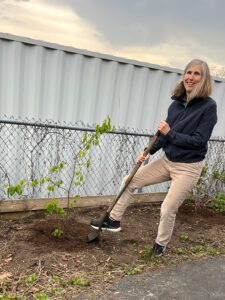
ReForest the City is a grassroots effort to encourage restoration of our urban tree canopy. Although Portland is known as “Forest City,” our urban tree canopy throughout the city has decreased dramatically in the last fifty years. Trees are incredibly important for a myriad of reasons, including general enjoyment, air quality, habitat for birds, and mental health.
ReForest has great partners on this project: the City of Portland parks department and the City’s wonderful new arborist Mark Reiland, Maine Audubon’s Bringing Nature Home program, Wild Seed Project, and the Portland sustainability office.
What is the ReForest the City group doing?
We have a number of current initiatives. First, we are hosting a series of Tuesday Tree Talks and Walks at Reiche Community Center. Speakers to date have been Mark Reiland, Portland’s City Arborist, Tyler Refsland of Wild Seed Project, and Andrew Tufts of Maine Audubon.
Second, we are planting native trees and shrubs in the yards of West End residents who apply. Maine Medical Center’s Community Cares grant is paying for that, and we have technical assistance and plant sourcing from Maine Audubon. We hope to plant up to fifty in the fall.
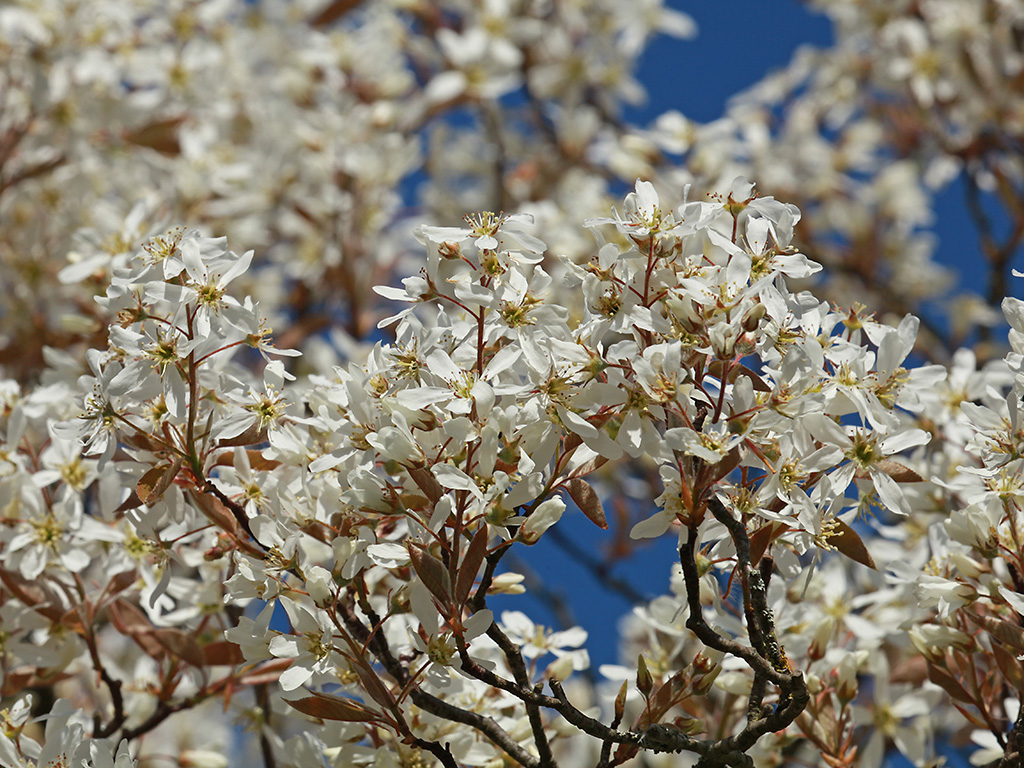
Third, we are working with the City to create an Adopt a Tree program where residents commit to mulching a street tree to help with water retention. Compacted soil, car doors, animal waste, and vandalism all take their toll on the trees that line our streets.
Last, we are updating an inventory of street trees in the West End, noting tree health, damage, and where there are empty tree wells.
What in your background led you to this?
Personally, my interest in this project grew from a desire to take a positive step (albeit an infinitesimally small one) to combat climate change and support both wildlife and a vibrant, healthy community. My mother was a nature lover and a grassroots environmentalist as early as the 1960’s. She was lovingly referred to in our community as “Mary Tree.” I think of her often as I work on this project. I have no special training.
What do you want everyone to know?
A healthy urban canopy cover is so important. Trees help manage storm water surges, purify the air, sequester and store carbon, are used as habitat for wildlife, and provide cooling. On a hot summer day the temperature under a tree can be 10 degrees cooler than the ambient air. Tree-lined streets enhance a neighborhood and increase real estate values. Being around trees can reduce blood pressure and improve overall emotional and psychological health. And trees add beauty into our daily lives.
Some folks worry about property damage from falling limbs or trees, but rarely does a healthy tree need to be removed to minimize that risk. A qualified arborist has many tools to help keep a tree both healthy and strong.
I have learned that a properly planted and cared for small tree or shrub will generally grow more quickly and be stronger than a larger plant of the same species. The smaller plant is less likely to be rootbound, so the roots grow more quickly into the soil. And it’s fun to plant from seed! So planting a tree or shrub doesn’t need to bust the budget.
How can people get involved?
There are many ways to get involved and we are always looking for volunteers. Folks with a background and/or interest in horticulture and those willing and able to wield a spade can help us to meet our goal of planting up to fifty more native yard trees and shrubs this fall. We are also looking for people to adopt a street tree. And there is plenty of non-hands-on work to do as well. And, of course, we are looking for folks who would like a native tree or shrub planted in their yards!
It has been heartening to learn how many people are passionate about trees and recognize the incredible importance of urban canopy cover. My hope is that this project will take root and grow not only in the West End but throughout the city.
Where can I learn more?
- Reforest the City’s webpage for native tree/shrub application and coming events.
- City of Portland Street Tree Map identifying location and species of trees
- Project Canopy, a website and newsletter produced by the Maine Forest Service addressing urban tree canopy.
- TreePeople is an organization in southern California working to improve urban tree canopy. They serve as an inspiration to us. The linked page speaks to the many benefits of trees.
- Maine Audobon

